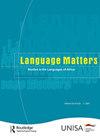Editorial
IF 0.8
3区 文学
0 LANGUAGE & LINGUISTICS
引用次数: 0
Abstract
From a sociolinguistic perspective, Namibia is a fascinating country. Under the peace agreement following World War I, South Africa was given a mandate to govern the former German colony of Southwest Africa. During this period of South African hegemony, Afrikaans became entrenched as the country’s dominant language. After independence, one of the steps in the attempt to bring Namibia, the former satellite state of South Africa, into the global arena was to change its language policy radically by introducing English as the only official language of the country and of education. Despite these changes, the roots of the historical legacy of Afrikaans are deeply embedded in the country’s language ecology. Another significant aspect of Namibia’s linguistic legacy is that it boasts a number of still-thriving indigenous languages from a language family that long ago became extinct in South Africa. For this reason, it seems appropriate to foreground Gerald Stell’s article on code-switching practices in Namibia, which can be read against this sociohistorical backdrop. His article takes the form of a case study involving informal intra-ethnic interactions featuring five Namibian ethnicities. He addresses the question of whether these multilectal behaviours can become stylistically functional and, subsequently, whether this stylistic potential translates into sociolinguistic indexicalities.编辑
从社会语言学的角度来看,纳米比亚是一个迷人的国家。根据第一次世界大战后的和平协议,南非被授权管理前德国殖民地西南非洲。在这个南非霸权时期,南非荷兰语成为该国的主导语言。独立后,试图将南非的前卫星国纳米比亚带入全球舞台的步骤之一是从根本上改变其语言政策,将英语作为该国和教育的唯一官方语言。尽管发生了这些变化,南非荷兰语历史遗产的根源深深植根于该国的语言生态中。纳米比亚语言遗产的另一个重要方面是,它拥有许多仍然繁荣的土著语言,这些语言来自很久以前在南非灭绝的语系。出于这个原因,Gerald Stell关于纳米比亚代码转换实践的文章似乎是合适的,这篇文章可以在这种社会历史背景下阅读。他的文章采用了一个案例研究的形式,涉及五个纳米比亚种族的非正式种族内部互动。他提出了这样一个问题,即这些多分支行为是否可以在文体上发挥作用,以及这种文体潜力是否转化为社会语言学指标。
本文章由计算机程序翻译,如有差异,请以英文原文为准。
求助全文
约1分钟内获得全文
求助全文
来源期刊

Language Matters
Multiple-
CiteScore
1.20
自引率
0.00%
发文量
19
期刊介绍:
The purpose of Language Matters is to provide a journal of international standing with a unique African flavour focusing on multilingualism in Africa. Although the journal contributes to the language debate on all African languages, sub-Saharan Africa and issues related to multilingualism in the southern African context are the journal’s specific domains. The journal seeks to promote the dissemination of ideas, points of view, teaching strategies and research on different aspects of African languages, providing a forum for discussion on the whole spectrum of language usage and debate in Africa. The journal endorses a multidisciplinary approach to the study of language and welcomes contributions not only from sociolinguists, psycholinguists and the like, but also from educationalists, language practitioners, computer analysts, engineers or scholars with a genuine interest in and contribution to the study of language. All contributions are critically reviewed by at least two referees. Although the general focus remains on multilingualism and related issues, one of the three issues of Language Matters published each year is a special thematic edition on Language Politics in Africa. These special issues embrace a wide spectrum of language matters of current relevance in Southern Africa.
 求助内容:
求助内容: 应助结果提醒方式:
应助结果提醒方式:


